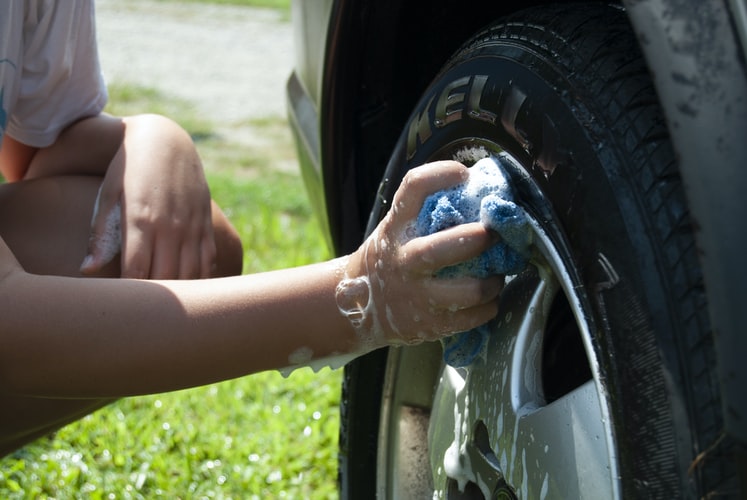With the ‘Staycation’ rising in popularity over the past year and a half, road trips are becoming a staple for holidaymakers. One of the benefits of living here in the UK is the ability to hop in our cars and drive to some of the most stunning places in the world in what can even be just a few hours. However, while the drives are convenient, our cars should still be taken care of to ensure that they are running smoothly and safely. To help you get started, we’ve put together a quick car care list, below.
Get Cleaning
There’s nothing quite as satisfying as having a clean car, and after a road trip is the best time to scrub it from top to bottom. Even if you started the trip with a pristine vehicle, all that time spent with the dust, debris and dirt of the roads can leave your car looking a little grimy. Similarly, spending hours in your car can build up dust in the interior as well as rubbish from drinks, crumbs from food and everything from parking tickets to fuel receipts can build up in the little nooks and crannies of the interior. Going through your car and emptying it of rubbish, then finishing off with a vacuum and dash interior sprays to clean off the trims can leave things looking as good as new.
Giving the exterior of your vehicle a thorough clean is also a great way to treat both you and your vehicle, following a road trip. Whether you wash it yourself at home or take it to a car wash, scrubbing off that dirt and debris will not only have it looking new but can protect the paintwork from any stains or wear in the long run. Finish up with a wax to keep things shiny and the paintwork protected, then spray some air freshener into the interior and your vehicle is ready for the next trip!
Check All Fluid Levels
You should check all fluid levels on your vehicle regularly, but particularly after a long and strenuous drive. You probably checked the oil, coolant and brake fluids before you left and topped up the windscreen wash, but checking them when you get back is still important. It’s also the prime time to replace whatever windscreen wash you’ve used up over the trip in case the levels are low. Knowing that the fluid levels are the same will give you peace of mind that you can embark on your next drive safely.
Check Your Tyres
Your tyres have taken the brunt of the force during your road trip, whether that’s fast motorway driving, bumpy country roads or a mixture of both. The roads can be rough, with everything from sharp objects that could pierce the tyres, to general wear or even a drop in pressure all affecting the tyre’s healthhealth. When washing your vehicle, make sure to check and clean the tyres thoroughly – you want to keep an eye out for any foreign objects stuck in or around the tyres, the tread depth and check the pressure. From here, you can remove any debris from between the tread, inflate the tyres if needed or act accordingly if something is wrong with the tyre or it’s been pierced.
Replenish Your Emergency Kits
Emergency kits are a must-have in your car regardless of how long your journey is and don’t have to be purely for emergencies. A good emergency kit will have medical supplies such as plasters, bandages and alcohol wipes, as well as painkillers, extras of any medicines you need, emergency torches, tow ropes, jump-start cables, power banks for emergency charging of phones or other tech, water, blankets and non-perishable snacks. If you’ve been on a long journey, you’d be forgiven for breaking into the painkillers, snacks or water along the way, traffic or not, or for needing to use the spare medications, plasters or bandages. Whatever the case, replenishing what’s been used and replacing anything that seems old or on its last legs will ensure you always have emergency supplies on hand when needed.
Have Any Problems Diagnosed And Repaired
If you’ve noticed anything unusual about your car while out on the road, now is the perfect time to get it checked out by a qualified mechanic. Anything from odd smells in the cabin to unusual noises when you start up the car, or even high vibration while idling are all issues that shouldn’t be ignored and should be looked at as soon as possible. These could be signs of issues with the engine, clutch, gearbox, turbo and more – you can book your car in for repairs with our team for peace of mind and get your vehicle back on the road safely in no time.
Check Your Mileage And Service Schedule
After a long trip, you’re going to have stacked up some miles so it’s the ideal time to check not only how many have been done, but where your vehicle now sits on the service schedule and how soon you need to book your vehicle in for a service. Many cars will have a service light to tell you, but having a clear idea for yourself will ensure you’re always on top of things. Generally, most cars will need to be booked every 10-12,000 miles, though this can differ depending on manufacturer, model and more. Check your handbook for more information, then book your car in with us if it’s due a service.
For more information or to book an appointment for servicing or repairs, get in touch with a member of our team, today.

